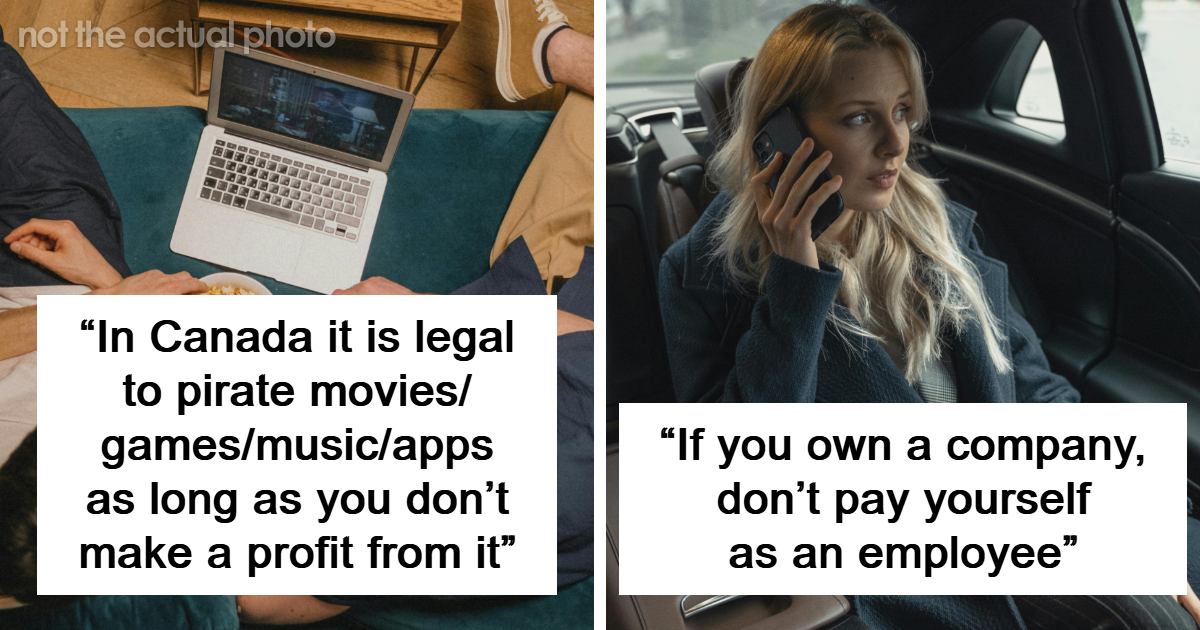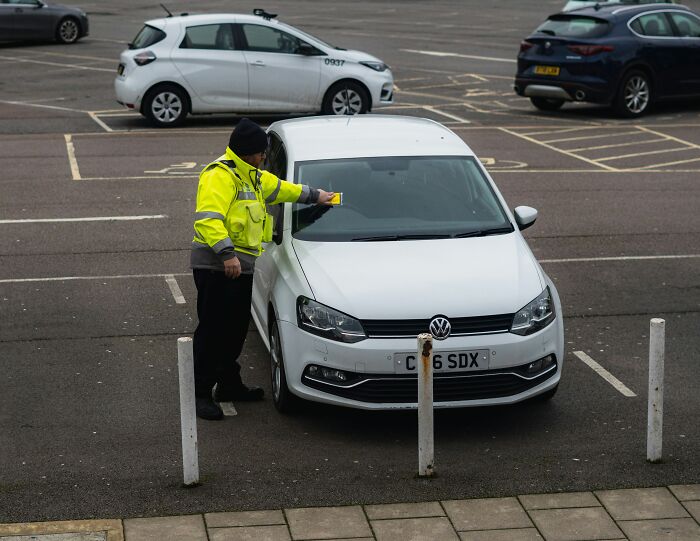
25 Lawyers Share The Sneakiest Laws And Loopholes They Have Discovered
The legal system has outsmarted many, yet lawyers excel at skillfully manipulating legal language to support their cases. It’s well known that there are numerous ways to bend or twist the rules without actually breaking them. Recently, a particular Reddit thread attracted attention online when several lawyers stepped forward to share unusual laws and obscure loopholes they’ve discovered, many of which aren’t common knowledge. Scroll below to discover valuable insights and clever methods available to ordinary people who want to navigate the law and beat the system without breaching any legal boundaries.
#1

Image source: KingPharaoh, Ron Lach
In Canada it is legal to pirate movies/games/music/apps as long as you don’t make a profit from it.
So if any Canadians here get a letter from their ISP telling them to stop, just ignore it. They can’t do anything in court.
#2

Image source: dirtnaps, Tima Miroshnichenko
If you own a company, don’t pay yourself as an employee.. Instead set it up as a corporation and pay yourself dividends.. you pay way less in taxes.
#3

Image source: anon, Caspar Rae
When you pay to park somewhere, and they hand you that ticket that says they are not responsible for any damage to your car? That’s a lie. They absolutely are and they just want to scare you off. They took a bailment on your car.
#4

Image source: putsch80, Strange Happenings
If you live in an oil producing state, odds are you don’t own the rights to the oil under your land. However, the person who does own the oil rights is fully entitled to come on your land, set up a drilling rig, lay pipelines, install storage tanks, build a frac water pond, and do basically anything needed to get the oil out of the ground. They don’t need your permission to do this (it is not trespassing). And there is virtually nothing you can do to stop them.
//oil and gas lawyer. Edit: added qualifier.
#5

Image source: JediMasterEvan5, Katelyn MacMillan
You can legally marry your first cousin in IL if 1.) Either party is over the age of 55 and 2.) they are sterile with a doctors note stating such.
#6

Lawyer here. Most people don’t know this, but if you have enough money and are white enough, I can get you off of pretty much anything.
#7

Image source: ClusterMakeLove, freepik
At one point, it was almost impossible to get no-fault a divorce, in Canada. A divorce based on adultery is still quicker.
As a result, a married couple would work together so that one of them would be caught having an affair. “We’ll be in this hotel room tomorrow night. Feel free to barge in.”
You’d even see people filing affidavits admitting that they’d banged their tennis pro.
#8

Image source: gleenglass, Kindel Media
In Oklahoma, if you are an adopted child, you will be considered an heir of both your adoptive parents AND your biological parents. Double Inheritance!
#9

Image source: itsnowornever, The Good Funeral Guide
Jury nullification.
A jury chosen by your peers may choose to “nullify” the law even though the evidence proves beyond a reasonable doubt they you are guilty of the charges. They can do this if they disagree with the law or think that rendering a guilty verdict under the circumstances would be unconscionable.
Jury nullification is a constitutional right, but lawyers or the court do not have to instruct jury’s on this right. Most jury’s are not aware of it.
#10

If you work retail you’re not required to have public restrooms unless the store exceeds a certain size. On the flipside, if you’re a pregnant woman, it’s illegal for any business to deny you a bathroom.
IANAL.
#11
When you pay for something with a Visa or Mastercard, if the clerk asks you for your ID you can simply refuse provided the back of your card is signed. No matter what the clerk, supervisor, or manager say, if they want to continue to accept Visa/Mastercard they must abide by the merchant agreement in place.
The merchant agreement specifically states that a signature is all that is required to process the payment, unless the signature doesn’t match the back of the card. They cannot force you to produce your ID no matter what they say about it being their store policy.
Also, they cannot impose a minimum amount for you to use your credit card. Merchants do this to avoid the charge they incur for processing the payment, but they are explicitly not allowed to.
Image source: rarehugs
#12

Image source: Aperture_Kubi, David McElwee
IANAL, but my boss homebrews beer, and he found out that in Texas, if you brew the beer yourself you can legally consume it even if you are underage. You can even buy all the needed equipment while underage too.
#13

Image source: itsamiracle, Sandsun
It’s okay to dump DMSO down the drain in our lab as long as you dilute it with water because the law says it has to be under a certain concentration to dump, but you’re still dumping the same amount of DMSO, it’s just not as concentrated.
#14
Minors _can_ enter into legal contracts, but they can also break them without penalty.
Image source: StabbyPants
#15
Back in my days of habitually roaming the streets drunk, I was arrested under CA penal code 647(f) a couple times, the law against “public drunkenness.”
Being the functional drunk that I was, I took the time to look into the law and learned that to be arrested under 647(f) requires more than just being intoxicated. It also specifies that you must be either unable to care for yourself OR be blocking public access (like a sidewalk or a freeway). They dropped my case both times before going too far, but I was prepared to go to court over it.
Image source: Balclutha
#16
As a lawyer I’m going to give a serious answer, which may not be super-interesting to the layman, but is an example of a true “loophole”.
In Australia (as in most developed countries) we have a set of laws designed to stop company management from improperly fleecing the creditors of limited-liability companies. So, for instance, if your company is going down the tubes and so you decide to simply transfer all of the company’s assets to yourself, or if you keep running up debts you could not possibly pay, then you can be held liable.
In order to be held liable for the above, the company’s liquidator needs to be able to prove that the company was insolvent at the time you engaged in the improper conduct, which necessarily requires analysing the company’s financial records. If the company never kept financial records (which is itself a breach of the law) then insolvency is presumed, to avoid company directors being able to avoid liability in that way.
Now for the loophole: The above presumption only applies if your company did not “keep” or “retain” financial records. However, the instant your company is in liquidation (the equivalent of “bankruptcy” in the USA) a company director ceases to be an agent of the company. So if they take the company’s books and destroy them, then the presumption of insolvency does not apply, since it was not the “company” that destroyed them.
You can be prosecuted for the destruction of the company’s books, but it’s basically a slap on the wrist fine in practice. So long as you can live with that, it means you can get away with virtually any unlawful conduct you engaged in while running the company.
The above may not be something that pops up every day, and it may not make for great party conversation, but it is a rather gaping loophole that makes a huge difference to a director’s responsibility in Australia.
TL;DR – If you are a company director in Australia and you improperly looted your insolvent company, you can get away with it if you destroy the company’s financial records *after* the company goes into bankruptcy.
Image source: iamplasma
#17
I got married young so my husband was legal to drink, and I wasn’t. When I did get drunk they tried saying they could charge my husband with contributing to a minor.
His response: “She’s my wife, what am i going to do? Tell her no?”
Since I was technically emancipated because I was married then I was responsible for myself, despite not being 18. They just told me to go sleep it off.
Image source: anon
#18
At some universities, like the University of Victoria (where I’m from, the parking around campus is surveyed by campus security. If you don’t pay for parking, you get a ticket for “x” amount of cash. If you don’t pay that ticket, what do they do? They freeze your grades and assign you a mark of incomplete. However, if you don’t actually go to the school, there isn’t anything they can do about it!
Image source: Loji
#19

Image source: glider524, Jerry Kavan
In Ohio, you may be convicted of drunk driving (OVI) for operating a bicycle under the influence of alcohol, but NOT for riding a unicycle or tricycle in the same condition. O.R.C. 4511.01(A).
#20

Image source: compson1, Andrej Lišakov
Lawyer here.
If you set off the alarm walking out of a retail store, just keep walking. The store personnel has no right to detain you unless they have an actual basis for doing so (e.g., someone saw you taking stuff off the rack and putting it into your bag).
Absent such cause, touching you could be civil battery, false imprisonment, and a host of other things. Have them call the cops; they’ll say the same thing.
(Edit: This is the *general rule* and may not actually be the law wherever it is that you live and/or shop!).
#21

Image source: brolix, Andrew Patrick Photo
Exceeding the posted speed limit in Texas (and a few other states) is not technically a crime… its just *really really* good evidence that you were speeding.
It falls under the umbrella of ‘prima facie’ law, which means on the face of things. Speeding is loosely defined as driving too fast for the given conditions. So if you are going over the posted speed limit but driving “safely” according to a set of standards and conditions, you are not speeding.
Good luck convincing a judge though lol.
#22
I regularly tell people there is no “magic number” on a DUI charge.
While there is a legal DUI limit (.08 in the states), above which you are automatically considered impaired so long as the reading is considered valid and admissable, most states have laws which allow ANY amount of alcohol in your system to qualify for the charge if the state can show the amount, no matter how low, sufficiently impaired your ability to operate the vehicle.
Here we have DUI (driving under the influence) and DWI (Driving while intoxicated) as, basically, separate laws. The first requires a .08, the second requires a showing you were intoxicated to a point your ability was sufficiently lessened.
Fun fact to throw out at the local bar when someone starts talking about how they had three beers and are below the legal limit, and therefore won’t get a DUI as a result.
Image source: LegalDad
#23

Image source: jumbobrain, Juan Fernandez
I work at a petrol station in the UK. If you fill up your car and walk into the shop without a suitable means of pay ( forgot your cash, card doesn’t work) we will give you an IOU form and you are not legally required to come back and pay the balance. We can send you a maximum of 3 letters and that’s it! It would cost is more for court costs etc to get the cash off you. ( sorry I ain’t pertaining to op’s lawyer answers but I thought you would find this useful).
#24

Image source: badforbusiness, Antoni Shkraba Studio
I’m not a lawyer but a paralegal in various capacities… you can pretty much claim anything as a work-related injury. If you get carpal tunnel for example, you can also say that your carpal tunnel causes you depression, anxiety and insomnia. If they’re not disputing the carpal tunnel, they probably won’t dispute anything else you add on. If they want to dispute it, they will have to pay for the doctor to prove you don’t have depression/anxiety/insomnia and they would rather just give you the money as part of your settlement.
Also, Wills and Trusts are pretty fun. You can pretty much do whatever you want. It’s like creating a little fantasy world for after you die and everyone will be obligated to honor your wishes the best they can.
#25
If you watch someone drown, no liability. If you start trying to save them and give up, you’re potentially liable.
Image source: Kindaclever


















Got wisdom to pour?
I had an amazing experience using this dating site https://www.carefreemeets.com/jerk-off-with-someone.html . The interface is clean, simple, and makes browsing through profiles feel effortless. The matching system is surprisingly accurate and helped me connect with people who truly share my interests. I also appreciate the strong privacy settings that make me feel safe. After just a few weeks, I met someone really special.
I had an amazing experience using this dating site https://www.carefreemeets.com/jerk-off-with-someone.html . The interface is clean, simple, and makes browsing through profiles feel effortless. The matching system is surprisingly accurate and helped me connect with people who truly share my interests. I also appreciate the strong privacy settings that make me feel safe. After just a few weeks, I met someone really special. Highly recommend it to anyone.